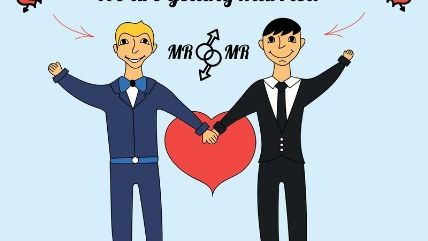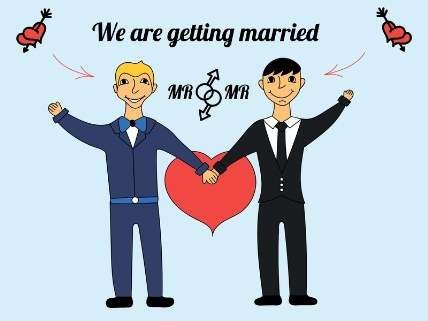Arizona Calligraphers Sue to Keep from Having to Write Gay Wedding Invitations
It's speech-but is it 'expressive' speech?


An interesting religious freedom and public accommodations case out of Phoenix is worth keeping an eye on for trends in this fight over who may be required to serve same-sex weddings.
The owners of art and calligraphy shop Brush & Nib Studio are suing the City of Phoenix to attempt to block in advance the use of its antidiscrimination ordinances against them. Breanna Koski and Joanna Duka are evangelical Christians. They don't support same-sex marriages. They want to put a statement up on their website that says, while they won't refuse to sell pre-made goods to anybody regardless of their sexual orientation, they would not be willing to produce custom art or calligraphy work that would be part of a same-sex wedding—invitations, thank you notes, et cetera.
Of note: Nobody has actually asked them to, yet. But Phoenix's ordinance clearly requires them to serve same-sex couples, and they said they've received two online forms for same-sex couples looking for information about their work. The studio says they haven't responded to them yet because they fear they'll be prosecuted if they refuse to do the work. They've sought representation by Alliance Defending Freedom, a Christian conservative legal organization who has been active in finding cases like this to represent (in pretty much the same way the American Civil Liberties Union has been active in finding cases to prosecute for the other side).
The City of Phoenix asked for the case to be dismissed for lack of standing. The studio is currently under no threat of prosecution. Judge Karen Mullins refused the request to dismiss this week, noting that the threat of prosecution is real and that the city had investigated other similar claims of discrimination. The studio asked for an injunction to stop the city from enforcing the law as the case moved forward. The judge rejected that as well. She doesn't think the studio has much of a case, based on current legal precedents.
Here's the part of the ruling worth paying attention to. Examining previous court precedents establishing when the government may and may not compel speech, Mullins determined that even though what the calligraphers are doing is obviously "speech," it wasn't "expressive speech" to produce wedding invitations and notes. They're just doing a gig. Mullins did not see anything resembling the projection of an opinion in what the women would be asked to do:
Here, there is nothing about custom wedding invitations made for same-sex couples that is expressive. The purpose of a wedding invitation is simply to convey the details of the date, time, and place of the wedding and to identify the persons getting married. The printing of the names of a same-sex couple on an invitation or thank you note does not compel Plaintiffs to convey a government mandated message, such as an endorsement or pledge in favor of same-sex marriages, nor does it convey any message concerning same-sex marriage. Indeed any conceivable endorsement of same-sex marriage that might be conveyed would be conveyed by the act of the marriage itself, and not by the creator or printer of the physical invitation itself. It is absurd to think that the fabricator of a wedding invitation for a same-sex couple has endorsed same-sex marriage merely by creating or printing that invitation. Moreover, there is nothing about the creative process itself, such as a flower or vine or the choice of a particular font or color, that conveys any pledge, endorsement, celebration, or other substantive mandated message by Plaintiffs in regard to same-sex marriage. Thus, the creation of custom lettering or artwork displayed on Plaintiffs wedding invitations and related wedding products does not constitute expressive speech.
Well then … why do so many Christian-owned businesses insist that it does? I realize we're well down the slippery slope of what happens when courts decide what does and doesn't count as "speech" and have been for a long time. It's an unavoidable result of having such an expansive First Amendment that is to our nation's credit. But when people like these women or other businesses say "This feels like an endorsement to us," is it really the government's place to say that it's not?
For that matter, let's extend the logic of this opinion. I doubt any reasonable person would think that a calligrapher or T-shirt maker or printer necessarily agrees with the messages they're hired to produce for customers. Therefore a reasonable person probably wouldn't conclude that any message Brush & Nub Studio produces for a paying client counts as an endorsement. Doesn't the logic of this justification suggest that there really isn't such a thing as "compelled speech" in this arena of business? If nobody actually believes the baker is a Nazi, then shouldn't he just make the Nazi cake?
No, he shouldn't, and the courts have generally agreed that private businesses can't be forced to express messages they find offensive. But the courts are also ruling on what counts as a message and, as a side effect, telling people whether or not what they're doing counts as an "endorsement" while completely ignoring how these people themselves see it.
Read the judge's ruling here. Alliance Defending Freedom has filed an appeal to a higher court to try again to get an injunction to keep Phoenix from enforcing the law.


Show Comments (382)